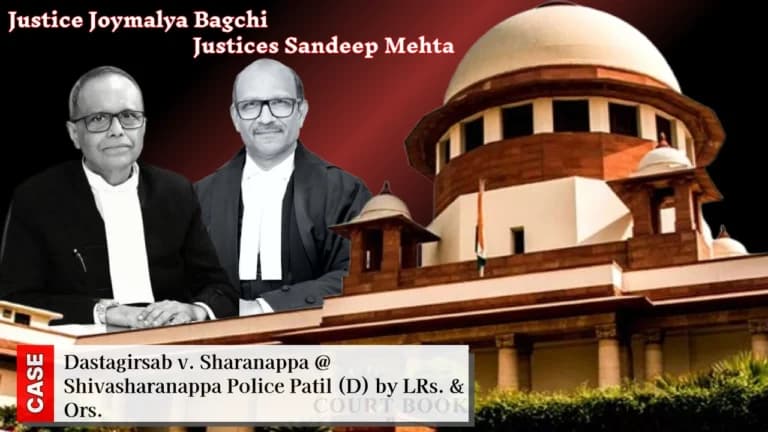The Supreme Court of India has ruled in favour of a purchaser in a long-running family property dispute, overturning a Karnataka High Court order that had granted partition rights to one of the coparceners. The bench of Justices Sandeep Mehta and Joymalya Bagchi observed that the sale of the disputed land was backed by legal necessity and thus binding on all members of the Hindu Undivided Family (HUF).
Background
The case revolved around nine acres of ancestral land in Bablad village, Gulbarga district, Karnataka. The property originally belonged to a Hindu joint family headed by Sharanappa, the Karta (head of the HUF). His four sons, including the plaintiff Kashiraya, were coparceners.
In 1995, Sharanappa sold the land to Dastagirsab (the appellant before the Supreme Court). The plaintiff alleged that the sale was done to fund his father’s drinking and 'bad habits' rather than any family necessity. He sought cancellation of the deed and partition of half the land.
The trial court dismissed the suit, holding that the sale was to meet family expenses, specifically linked to the marriage of Sharanappa’s daughter. The High Court, however, reversed that finding in 2007, ruling that the purchaser had failed to prove legal necessity.
Court's Observations
The Supreme Court carefully re-examined the evidence. It noted that the plaintiff himself admitted his father had told him the land was sold to meet family needs. Importantly, sale receipts bore signatures of Sharanappa’s wife, daughter, and two sons, confirming that the marriage expenses had strained the family’s finances.
Read also:- Allahabad High Court Quashes Kidnapping Case Against Himanshu Dubey, Says Victim Left Home Voluntarily
"The High Court glossed over the fact that even years after the daughter’s marriage, debts and financial burdens can persist," the bench observed. It added that families often continue repaying obligations incurred during such events.
The Court also underlined the principle that a Karta of a Hindu joint family has wide discretion to sell property for legal necessity. Once such necessity is established, other coparceners cannot challenge the transaction.
On the question of whether the buyer acted in good faith, the judges pointed out:
"The 5th defendant-purchaser could not have doubted the right of the Karta to effect the sale. He acted as a man of ordinary prudence."
Read also:- Calcutta High Court Orders Husband to Pay Monthly Maintenance Despite Joblessness Claim
Decision
Setting aside the Karnataka High Court's decree, the Supreme Court restored the trial court's decision that had dismissed the plaintiff’s claim. The appeal by Dastagirsab was allowed, with the Court affirming that the sale deed executed in 1995 was valid, executed for legal necessity, and binding on all family members.
With this ruling, the apex court closed the chapter on a property dispute that had stretched over two decades, clarifying once again that legal necessity like family marriages can justify a Karta’s decision to alienate joint family property.
Case Title: Dastagirsab v. Sharanappa @ Shivasharanappa Police Patil (D) by LRs. & Ors.
Case Number: Civil Appeal No(s). 5340 of 2017














